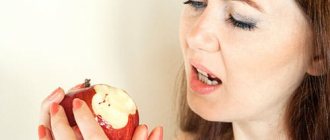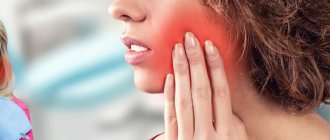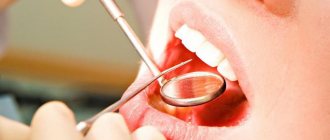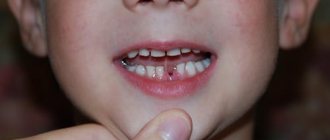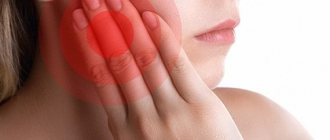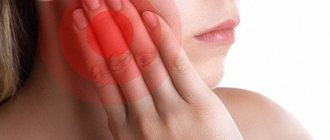Why do teeth hurt mostly at night and not during the day? This question interests a lot of people. Quite often, patients complain that the pain intensifies mainly at night. There are diseases that lead to the development of such ailments. Toothache develops due to the fact that the oral cavity contains a large number of nerve fibers, which become inflamed under the influence of various factors.
Common Causes of Pain
Experts identify the following diseases that lead to the development of toothache:
- Caries. The development of caries leads to damage to tooth enamel and dentin. In the resulting carious cavity, pathogenic microorganisms accumulate and rapidly multiply. When caries reaches a complicated stage, harmful bacteria practically reach the pulp, which is penetrated by nerve fibers. Pain syndrome occurs under the influence of irritating factors.
- Pulpitis. At this stage, damage to the pulp occurs, an inflammatory process develops in it, which spreads to all nerve endings. Painful sensations can occur without any external signs of disease.
- Periodontitis. With this disease, the inflammatory process develops in the tissues surrounding the tooth.
- Flux. This complication appears in the absence of timely treatment of pulpitis. The danger is that the developed inflammatory process spreads to the jaw and periosteum.
- Non-carious lesions of the enamel and hard layers of teeth. They arise as a result of mechanical damage to the tooth, resulting in destruction of the enamel. The main cause of pain with such a lesion is the same processes that occur during diseases.
- After the tooth filling procedure. When filling is performed incorrectly, when the specialist performs the manipulations incorrectly or does not follow the correct procedure, the patient may experience unpleasant pain, which intensifies mainly at night.
- After tooth extraction. Painful sensations that worsen at night may develop after tooth extraction.
Possible reasons
Painful sensations in the pulp are always associated with infection. Its penetration into the body is determined by three factors - physical, chemical or biological. Physical factors include overheating of tissues, traumatic fracture of the dental crown, and pathological abrasion of teeth. Pulp stones (dentin formations) can also cause severe paroxysmal pain. They put pressure on blood vessels, which disrupts microcirculation, irritates nerve endings and provokes the development of edema.
Chemical or iatrogenic factors are always associated with unqualified actions of the dentist. Among them are violations of the rules for using etching gel (necessary for filling teeth), the use of low-quality/toxic filling materials, and strong antiseptics for treating cavities.
Biological factors include cases of infection entering simply into the pulp chamber (for example, during caries). The risk of tissue infection increases with a secondary caries process that develops under the filling. The infection can also enter through the dentinal tubules or the apical foramen (located at the top of the tooth).
Pain appears immediately after inflammation of the pulp. It is spontaneous, but can intensify after mechanical impact on the tooth. Attacks of pain last from 10 to 30 minutes and in some cases are not amenable to drug pain relief. What to do? Contact your dentist as soon as possible and undergo treatment.
Physiological processes
The most common factors that cause pain at night are physiological. Most often, this phenomenon is caused by a horizontal position taken during rest. In this position, blood flows intensely to the head, brain and jaws, which increases pressure on the inflamed tissues and nerve endings of the teeth. It should be noted that this process is not typical for all dental diseases. The most common cause of acute and severe toothache at night is pulpitis. At this time of day, excessive pressure forms in the inflamed pulp due to increased blood flow, and bundles of nerve fibers begin to send active signals to the central nervous system. Excruciating pain, mainly at night, can also occur with periodontitis and periodontitis.
Examples of interpretations
To correctly interpret a dream, it is advisable to look at several different interpretations. You should also focus primarily on modern dream books , since attitudes towards dental health in the past and present can vary greatly (for example, in some Russian provinces it was customary to blacken individual teeth, which was a symbol of belonging to a noble family).
We should not forget that the most accurate interpreter of one’s own dreams is a person’s intuition.
Dream Book of David Loff
Bad teeth warn the dreamer of an impending career collapse. A person needs to give up impulsive actions and risks in the near future, since luck will not be on his side. A lost rotten tooth, which caused the dreamer great discomfort, indicates liberation from a heavy burden with the assistance of an influential person .
If a person in a dream, in addition to terrible pain, has a swollen cheek, then this portends him committing a shameful act. The stronger the intensity of pain, the more unpleasant the possible negative events will be.
The Wanderer's Dream Book
Modern esotericist Terenty Smirnov believes that the key importance for the interpretation of this dream is the personality of the dreamer, his age and type of activity. If a pregnant woman wants to understand why she dreams that her tooth hurts, she needs to remember the people she met just the other day - behind their mask of friendliness lies envy and resentment.
For an adult man, such a dream promises a series of minor failures that can unsettle him for a long time.
The interpretation of such a dream for a child is simple: either he develops a painful process in the mouth area, or he deceived someone and regrets it. It is curious that if a sore tooth also bleeds, then this indicates the dreamer’s damaged reputation as a result of false rumors and gossip .
Denise Lynn's interpretation
Painful sensations in a dream allow us to speak about the dreamer’s excessive restraint in real life, his tendency to hide his emotions behind ostentatious indifference and calm. Pain in the teeth indicates that a person prefers to tell white lies rather than frankly express his thoughts. Also, such a dream may indicate the following points:
- The dreamer will face the consequences of the mistakes he has made.
- A person spends too much time feeling sorry for himself.
- An upcoming quarrel or discord over money or worries regarding your well-being.
Going to the dentist in a dream means the dreamer is counting on outside help in solving his problems. If a person looks at a disturbing tooth in the mirror, then this indicates a tendency to justify himself and his actions. An attempt to independently pull out a diseased incisor - the dreamer will dare to take decisive actions that will end in success .
Interpretation by Gustav Miller
A famous psychologist believed that bad teeth symbolize inner fear of other people, as a result of which a person is forced to hide his true intentions and, if necessary, lie. Also, in order to understand why you dream of a bad tooth, you need to know that toothache often occurs in real life, while a person is sleeping. The brain, focusing on these signals, creates a dream with a similar plot (i.e., this indicates the beginning of a pathological process in the mouth).
You should also pay attention to the following points:
- Pain in the teeth indicates that a person has taken on a task that is too difficult for him.
- The dreamer has a sensitive psyche that reacts sharply to the slightest trouble in life.
- A person needs mental peace, his body is tired and requires rest.
If unpleasant sensations appear in a dream after brushing your teeth, this indicates that the person is too zealous in trying to live up to his ideal image (or idol).
Pain while eating indicates the dreamer's reluctance to do what he is forced to do at the moment.
Physiological factors
A separate group of reasons why patients experience toothache at night includes physiological factors:
- The time interval is from 00 o'clock to 5 am. This period of time is the most stressful and difficult for the entire human body. It is at this time that pain intensifies and sensitivity to any lesions and diseases, including dental ones, increases.
- Physiologists say that at night the vagus nerve called the vagus is activated, which has a large number of branches, some of which extend to the head area. The vagus affects the general condition and mood of a person. At night, the tone of the vagus nerve changes, which leads to increased sensitivity and pain.
- Also, based on the characteristics of the biorhythm, at night, even in a healthy person, blood pressure increases significantly. High blood pressure increases toothache.
Treatment.
Treatment of bruxism still remains a difficult problem. It depends largely on the time of development, causes and nature of the disease. Its treatment will be more successful the earlier the disease is diagnosed. You should not be concerned about short-term (up to 10 seconds) irregular attacks of teeth grinding. Most likely, this is not bruxism, but immediate reactions to stressful situations of a healthy person. The alarm should be sounded when such attacks become regular.
It is almost pointless to fight bruxism on your own. As soon as you suspect you have this disease, contact a sleep specialist. He will give you professional advice and prescribe competent treatment. It is important to know that bruxism in children sometimes does not require special treatment, and may eventually go away on its own by the age of 6-7 years. Bruxism in adults must be treated.
If bruxism persists in an adult, then:
- If possible, it is necessary to eliminate any existing dental problems or malocclusions.
- While sleeping, wear a special intraoral protective device (mouth guard) made of rubber or soft plastic, which is made to the shape and size of your teeth, is fixed between the teeth and prevents injury. Although this device helps to cope with bruxism, it does not cure it.
- As an additional treatment, you can use magnesium, calcium and B vitamins. Saturating the body with these microelements and vitamins can reduce the convulsive activity of the masticatory muscles during sleep.
- You can also apply a warm, damp towel to your cheeks, this will help you relax muscles that are tired from clenching your teeth.
- Learn to relax. - Since the main cause of bruxism is everyday stress, any means of relieving stress can help you - listening to music, reading books, walking or taking a bath. You may need to seek counseling to learn how to effectively cope with stressful situations.
- Psychotherapy is the best way to help, which is aimed at identifying conflicts, understanding them and developing the ability to more effectively cope with the everyday difficulties of life.
Other lesions
Sometimes pain that is mistaken for a toothache may be due to the effects of other diseases. These include:
- Inflammation of the tertiary nerve can cause severe jaw pain at night. As a result of the influence of various factors, the nerve can be severely irritated, which leads to sensations that can easily be confused with toothache.
- If toothache is felt not only in the area of one tooth, but spreads throughout the entire jaw, then such phenomena may be symptoms of inflammation of the periosteum of the tooth, and even some ENT diseases: sinusitis, sinusitis and otitis media. In a horizontal position, the outflow of fluid from the sinuses is hampered, which increases the discomfort and spreads it to the entire jaw.
In some cases, toothache at night can occur for reasons that are not related to dentistry. For example, due to severe exhaustion of the nervous system, lack of sleep or regular smoking.
Why do my teeth hurt at night but not during the day?
It would be more correct to say that your teeth hurt more at night. During the day there are too many distractions that prevent you from focusing on your feelings. Work, household chores and even simple walking force the brain to work in a different direction, which leads to less pain.
Another, main factor is physiological. In the evening, the level of corticosteroids in the body begins to decrease; they are “responsible” for reducing pain. Hormone production reaches a minimum between midnight and five in the morning, after which the tooth gradually begins to fall out. Usually by this time the exhausted body “gives up”, the person falls asleep and gets a short respite.
Another cause of night pain is the horizontal position of the body during sleep. The rush of blood to the head increases, while the nerve roots are compressed and the pain intensifies. This is especially noticeable with pulpitis, when the sensations become unbearable.
Important.
If you notice increased pain while lying down, raise the pillow higher and practically sit down. The blood will drain from your head and it will become a little easier.
It’s a special problem when the tooth under the filling hurts. This means that an infection has entered the treated cavity and an inflammatory process has begun. The resulting pus, even in a minimal amount, has no way out and begins to compress the nerve roots, which leads to severe acute pain that can even radiate to the ear and throat.
At night, it is also possible to experience minor pain after the removal of a tooth or nerve, as well as after treatment of deep caries. This is normal and does not require any serious measures to be taken. In this case, it is enough to take a tablet of any analgesic or rinse your mouth with a warm soda solution.
Important.
If you had a difficult removal and then experienced severe pain at night, you should immediately consult a doctor in the morning. Alternatively, bone fragments could remain in the socket. In this case, the entire jaw will hurt, and it will be almost impossible to relieve the sensation even with strong medications.
What to do if your tooth hurts badly at night
It should be remembered that all independent procedures will only help temporarily reduce pain and not eliminate the disease. The most common folk methods include:
- Painkillers. Such medications effectively help eliminate unpleasant symptoms, which alleviates the general condition of a person. The dosage of drugs should be taken according to the instructions. Overdosing on a medicine can cause serious problems.
- The use of tinctures of medicinal herbs for rinsing the mouth. The following herbs are suitable for these purposes: calendula, oak bark, calamus root, chamomile, plantain and sage. They have anti-inflammatory and antiseptic effects. Infusions should be used only if there are no allergic reactions to the herbs used.
- Rinse with salt solution. This solution helps to temporarily eliminate discomfort and make you feel better. It does not cause allergies.
If the temperature rises sharply or swelling occurs, this may be a sign of the spread of the inflammatory process. In such a situation, you must immediately seek the help of a specialist.
What to do if you have tooth pain at night
It is necessary to assume that at night the pain becomes much stronger than during the day. Physiologically, a person should already be resting, but he has to look for a way to alleviate his condition. The worst case scenario is when acute pain causes you to wake up.
In such situations, all thoughts are aimed at eliminating unpleasant sensations as soon as possible. It is unlikely that someone will prepare a complex decoction or tincture in the middle of the night.
We offer several quick solutions to help relieve the pain at least a little:
- Immediately take an analgesic - any one you have in the house. The group includes analgin, tempalgin, pentalgin, ketorol. Paracetamol will help. Be aware of the danger of overdose. Medicines begin to act approximately 20-30 minutes after administration.
- Apply something cold to your cheek. Take ice or a piece of meat out of the freezer; even a pack of dumplings will do. Wrap it in a towel and apply it to the sore cheek. The cold will help relieve swelling from the tissues, and the pressure on the nerve roots will decrease. It is important to remember that you need to take breaks every 15-20 minutes so as not to chill the trigeminal nerve.
- Rinse your mouth with a warm solution of baking soda - one teaspoon per glass of water. Repeat rinsing every half hour. It will not be possible to completely remove the pain, but it will become a little easier.
- Brew any herb that has anti-inflammatory properties - chamomile, thyme, oregano. Standard proportions are one tablespoon per glass of boiling water. Infuse, cool, strain. Rinse only with warm solution.
- Use folk remedies - apply a piece of lard to the sore gum, a clove of garlic to the wrist. If you have it in the house, you can rinse your mouth with vodka or cognac (do not drink, this is important) - at first you will feel a sharp pain, then it will become easier.
If you are tired and can no longer walk, lie down in a semi-sitting position. In this case, the head must be higher than the body.
To distract yourself, you can do some quiet work - ironing clothes, drawing, embroidering, writing notes. The main thing is that you can switch your attention.
You will need to survive the most difficult time - from midnight to five o'clock in the morning. In the morning, the production of corticosteroids will begin to increase, and the pain will subside a little. We recommend that you prepare for a visit to the doctor once. No one else will help you.
Do not ignore preventive visits to the dentist.
It is enough to visit a specialist 1 – 2 times a year, which will allow you to promptly identify any dental problem at an early stage of development. This means that its elimination will be quick, easy and without complications.
By clicking the “request a call” button you agree to the personal data processing policy.
Visit to the dental office
When visiting a dental clinic, the specialist will conduct a thorough examination of the oral cavity, then prescribe the patient to undergo an x-ray examination. Images are necessary to determine the extent of tissue damage, detect the source of inflammation and make the correct diagnosis. Treatment of deep caries and pulpitis is carried out using the same methods. During treatment, the doctor:
- Provides local anesthesia by injecting an anesthetic into the tissue surrounding the diseased tooth.
- Eliminates affected tissue.
- Performs mechanical and antiseptic treatment of canals.
- Performs canal fillings.
- Takes a control photograph of the tooth.
- Restores the damaged part of the tooth.
After undergoing treatment for deep caries or pulpitis, the patient may still feel discomfort and unpleasant sensations for some time, which should subside over several days. In case of periodontitis and periostitis, it is initially necessary to eliminate the source of infection. To do this, root canals are cleaned and processed. Treatment of gumboil and periodontitis takes longer. After eliminating the source of infection, the canals are filled and the crown of the tooth is restored. Sometimes surgical methods are used to treat flux. If you ignore the problem and do not seek the help of a dentist, then the chances of saving the tooth are greatly reduced. If acute toothache occurs due to the eruption of the eighth tooth, then it is very important to promptly seek the advice of a specialist. After examining the oral cavity and conducting an X-ray examination, the doctor will select the most effective treatment method in each specific case. The dentist begins performing therapeutic procedures after administering local anesthesia. Modern anesthetics are highly effective and well tolerated by the body.
The meaning of the image of teeth
Since ancient times, it was believed that teeth represent a person’s vital energy, health, ability to compete and potential. Painful sensations may indicate that the dreamer has recently been wasting his energy on useless entertainment. However, there are some other interpretations of this symbol:
- The dreamer will experience sudden mood swings. Aching pain indicates the development of personality and the growth of wisdom. It is quite possible that the dreamer will soon learn a valuable lesson from the mistake he made.
- Failures in financial affairs, unexpected loss of money.
- The dreamer will become an object of ridicule and slander. In order to understand why you dream about bad teeth, some dream books recommend paying attention to friends who have a tendency to talk about someone behind their back. Most likely, these people are weaving intrigues against the dreamer.
- Unpleasant news from family and friends.
- The person has health problems, including teeth.
Some psychologists believe that the mouth hurts in a dream in cases where the dreamer secretly regrets the words he said, or this fact indicates a lack of self-confidence. If a person dreamed that he himself pulled out a bad tooth, then this indicates a successful outcome of a matter that tormented the dreamer for a long time.
Severe painful sensations can also foreshadow a shameful situation in which the dreamer will find himself in the near future. From an esoteric point of view, such an image personifies an upcoming quarrel or even a loud scandal.
According to the family dream book, a tooth hurts in cases where the dreamer is worried about his family. Loose teeth indicate the instability of a person’s current situation (primarily this concerns the financial sphere). Finally, experiencing a toothache during treatment at a dentist’s appointment means the appearance of an unexpected ally or patron who can resolve most of the problems.
Oral care
After treatment and elimination of painful sensations, to prevent such situations in the future, you should adhere to the following mandatory rules:
- Carry out regular, thorough cleaning of your teeth and gums with a brush and paste. Use additional hygiene products in the form of rinses, flosses and irrigators.
- undergo regular preventive examinations with a dentist.
- It is extremely important to eat right. To do this, you need to reduce the amount of sweets, confectionery and sweet carbonated drinks you consume. It is important to balance your diet with as many fruits, fresh vegetables, and herbs as possible.
- try not to smoke or drink alcoholic beverages. Nicotine negatively affects the entire human body. People who smoke develop pigmented plaque on their teeth, which provokes the development of gingivitis and periodontitis. Alcohol reduces immunity and contributes to the development of mucosal dystrophy.
- carefully monitor and be attentive to your health!
Stomach hurts after eating
With bloating due to excess gas formation, pain usually occurs after eating in the area around the navel, and the attacks are cramping in nature. In this case, the discomfort usually decreases after the gases pass. In case of flatulence or overeating, abdominal pain goes away on its own within a few hours.
In irritable bowel syndrome, the regulation of the colon is disrupted. This disease is characterized by periodic severe cramping or cutting pain in the abdomen, combined with a strong urge to go big. Moreover, attacks almost never occur during sleep, and their frequency increases under stress.
In such situations, it is recommended to adjust your diet. You should not eat a lot, or indulge in sweets, fresh baked goods and legumes (peas, beans, lentils). If changing your diet does not help and the pain continues, you should consult a gastroenterologist. Irritable bowel syndrome also requires a course of treatment as prescribed by a doctor.
Features of the occurrence and course of night pain
The main factors that increase pain at night are psychogenic and endocrine. First, a person's attention during the day is occupied by aspects of his active life. Both mental and physical labor are factors distracting from pain. The daily production of adrenal hormones predominates during the day. The adrenal glands produce glucocorticoids, which are anti-inflammatory and analgesic agents. At night, the level of these hormones decreases. Consequently, during the day the pain is weaker and a person’s so-called pain threshold is higher (this means that the pain sensation must be stronger than at night in order to cause discomfort in a person).
At night, a person feels pain especially strongly, as he becomes more passive in his movements and begins to “listen” to the body

